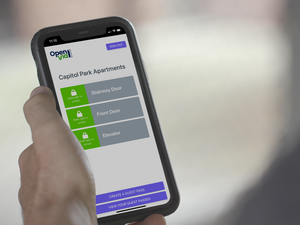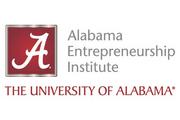
The CEO of local startup OpenVia, which recently raised a $1 million funding round, calls Birmingham a vibrant startup environment.
Patrick Campbell is the leader of the company, which is an access control platform that gives residents, visitors and delivery drivers access to properties through their smartphones. The company works with existing access control or gate systems without creating the need to update or replace them, saving properties thousands of dollars.
And the Magic City-based startup, located at Hardware Park, is looking to grow.
It currently has four employees and works with properties both in and outside of Birmingham.
Its most recent funding round was led by Chicago-based Sandalphon Capital, with participation from Locker One Ventures, Blue Field Capital, The Fund, Sachse Family Fund and multiple angel investors. To date, OpenVia has raised just under $1.25 million.
Now, the startup is in partnership talks with several companies that have a nationwide multifamily and commercial property customer base.
“The hope is that we can massively accelerate growth through these partnerships, in addition to our own in-house sales efforts, to bring several hundred properties on our network by the end of 2023,” Campbell said. “We’re already working on a few new products that are based upon our core technology that should be really attractive to a wide range of properties.”
As for the long term, OpenVia aims to expand its partnership strategy and work up-market to integrate and form deep partnerships with major property management companies, delivery companies and service providers both in the U.S. and into Europe and Latin America.
“We’ve got a really large market, easily hundreds of thousands of properties in the U.S. alone, and
we see ourselves grabbing a significant share of that market over the next three to five years,” Campbell said.
And when it comes to Birmingham, Campbell sees both opportunity and room for improvement.
“We’ve seen some highly successful businesses built (in Birmingham) and quite a few big exits,” Campbell said of the city. “I think we’re likely to continue to do that. We have several inherent factors working in our favor including some great universities, a fairly deep talent pool, a reasonably low cost of living and costs like office space tend to be lower here than in other parts of the country — and even the South — which helps startups get started.”
Campbell added that good resources are in place for startups just getting off the ground as well as a growing network for businesses that are further along.
“That said, I think we’ve got a few areas to improve,” Campbell said. “It’s almost like Birmingham is a great place to start and a great place to be big, but can be tough to be a seed-stage business that’s still figuring out every detail of the business. Capital can still be hard to come by. We were lucky to be able to attract investors from across the country, but not every company has the ability to do that.”
As for the state as a whole, Campbell said two things would help startups that are beyond the ideation phase: capital and customers.
“Capital can be in fairly short supply, but it’s critical for early-stage companies to be able to grow quickly and attract top-tier talent,” he said. “Few companies want to take a bet on working with a company that doesn’t have a decent cash runway. Similarly, in the competitive technology market, top talent needs to be confident that the company they’re going to work for is well-capitalized.”
Campbell added that investors should be more incentivized to invest in early-stage companies by conforming to Federal QSBS capital gains exemptions on state income tax.
“Secondly, I would really encourage established companies to actively seek out ways to become customers of Alabama startups,” he said. “One of the great attributes of startup hubs like silicon valley have going for them is that there is an extensive customer base of slightly more established companies that can become paying customers for startups earlier on in their journey.
“I know a lot of corporations here do work with startups, but becoming an early customer of an Alabama startup should be as celebrated as being an early investor or an early employee of a startup.”









